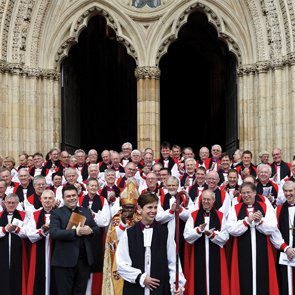The historic ordination of the first female bishop in the Church of England has already made an impact on ecumenical relations, the Catholic archbishop responsible for dialogue and unity said this week.
On Monday Revd Libby Lane was ordained and consecrated as Bishop of Stockport following the passing of legislation allowing women bishops by the Church of England’s General Synod in July last year.
But Archbishop Bernard Longley, who is co-chairman of the Anglican-Roman Catholic International Commission (Arcic) and leads the Bishops’ Conference of England and Wales dialogue and unity department, said: “Sadly ... Bishop Lane’s consecration at York Minster serves to highlight one of the major challenges that Anglicans and Catholics in England face on the path towards full visible unity.” He added: “The ordination of women to the episcopate presents a further obstacle to achieving that unity among us for which Our Lord prayed.”
Bishop Lane’s consecration was attended by representatives of the Methodists, the United Reformed Church, the Moravian Church and other denominations, but no one from the Catholic Church was present in an official capacity at Monday’s service in York Minster.
The Bishop of Shrewsbury, Mark Davies, was invited to attend but a spokesman said he had another engagement. The Provincial of the Carmelites, Fr Tony Lester, had planned to be present but was thwarted by a bout of toothache. No one else was able to go in his place.
Canon John O’Toole, ecumenical officer at the Bishops’ Conference, said he could see that there might be concerns among some Catholic prelates that their attendance at the ordination of a female bishop might be construed as support for the process – but, he stressed, this would absolutely not be the case. “People might have thought, by being present what message would it give out?” he said.
But Catholic bishops and priests have attended Anglican and other Christian denomination services without it meaning an endorsement, he said.
He said the bishops worked closely with their Anglican counterparts in most areas of the country, and said he hoped this would continue in dioceses where a Catholic bishop found himself with a female opposite number in the future.
“There may be a bit of initial hesitation, because many people don’t like change, but I think it will very quickly be seen as normal. Bishops are pragmatic and if there’s been a woman Methodist Superintendent in an area, for example, they’ve been able to work with them.”
He pointed out, however, that there was already both Catholic and Anglican female representation on Arcic. “It does change the culture and it might be that the culture will be different because it’s not all men,” he said.
Catholic and Church of England bishops also gather collectively for bi-lateral meetings.
It is normal for local Christian leaders to be invited to the ordinations of both Catholic and Anglican bishops. Catholic representation is expected at the ordination of diocesan bishops in the Church of England but not necessarily at the consecration of suffragan bishops.
In September 2013, however, Archbishops Bernard Longley and George Stack and the Nuncio to Great Britain, Antonio Mennini – were present at the ordination in Westminster Abbey as suffragan Bishop of Tewkesbury of Martyn Snow, and of Jonathan Goodall to be “flying bishop” of Ebbsfleet, ministering to those in the diocese of Canterbury who cannot accept women’s ordination. Bishop Goodall is a former ecumenical secretary to two Archbishops of Canterbury.
Bishop Lane’s installation as bishop of Stockport will be at Chester Cathedral on 8 March. Bishop Davies is likely to again receive an invitation to attend this ceremony.




 Loading ...
Loading ...